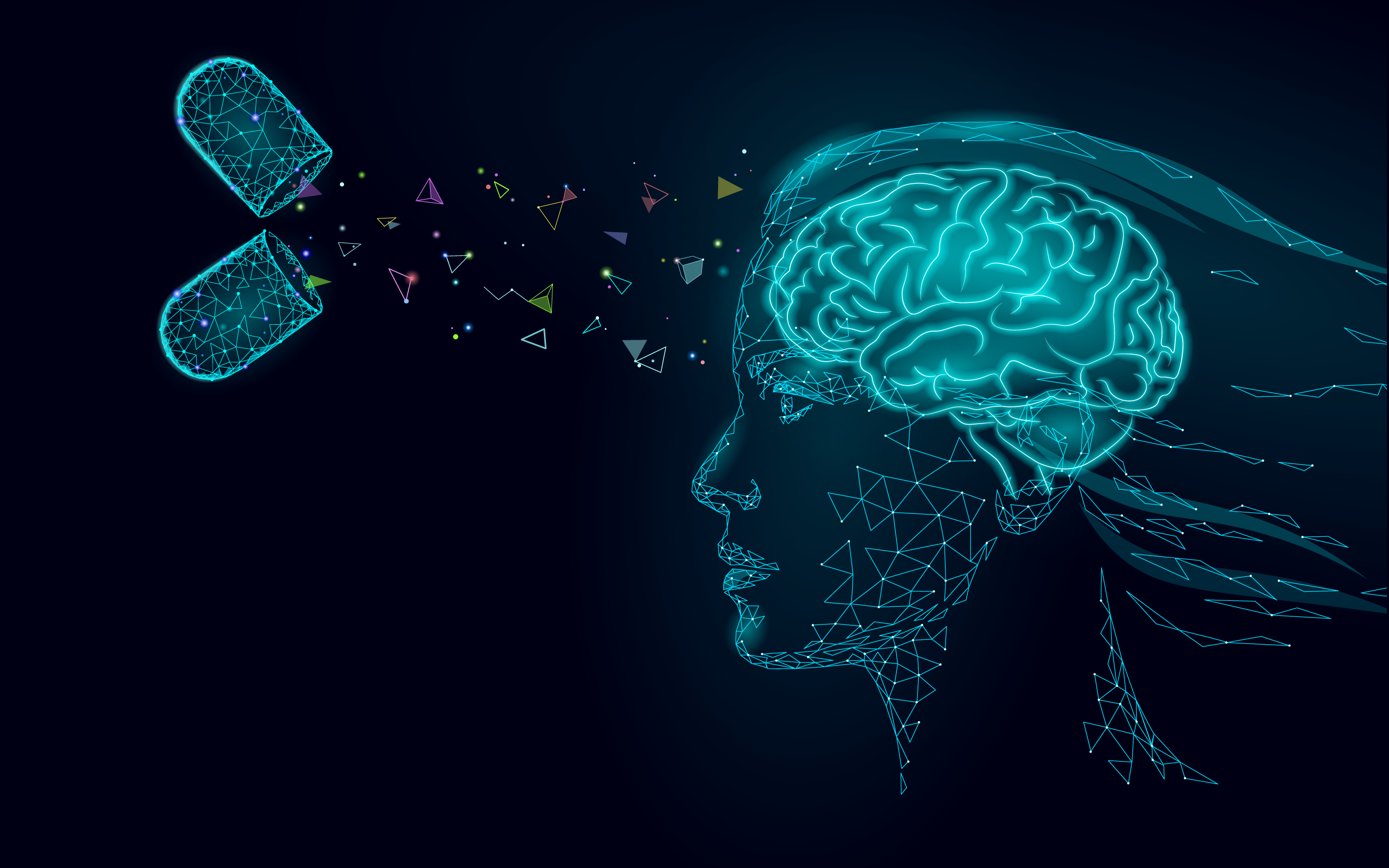What are Nootropics?
In today’s fast-paced world, the pursuit of mental clarity, focus, and enhanced cognitive performance has become increasingly important. Nootropics, commonly referred to as “smart drugs” or “cognitive enhancers,” are a class of natural or artificial compounds that have been thoroughly researched for their ability to boost cognitive processes. Dr. Corneliu Giurgea, a Romanian chemist and psychologist, first used the word “nootropic” in the 1970s.
The first known nootropic, Piracetam, was developed by Dr. Giurgea, and it served as the basis for subsequent investigation in this domain. However, certain requirements must be met for an ingredient to be designated as a nootropic. It should boost memory and learning capacity, improve cognitive function in stressful situations, and be neuroprotective, which means it should shield the brain from physical or chemical injuries.

What are different sources of Nootropics ?
Nootropics, frequently referred to as “smart drugs” or cognitive enhancers, have drawn a lot of interest because of their capacity to improve cognitive processes and mental sharpness. These potent compounds come in a variety of forms, each with its own advantages and modes of operation. Let’s examine the several nootropic categories that have drawn attention from researchers and those looking to improve their brain function.
- Prescription Nootropics:
Medical interventions known as prescription nootropics are used to treat particular mental and cognitive disorders including dementia and ADHD. Health care practitioners handle different medications, such as Adderall, Memantine, and Provigil (modafinil), to treat these disorders’ symptoms. Some prescription nootropics are taken “off-label” for mental stimulation and performance improvement, even when they successfully treat their intended conditions. To guarantee safe and proper use, prescription nootropics must be used under the direction and supervision of an authorised healthcare professional.
- Synthetic Nootropics:
Synthetic nootropics are racetam-like substances. They may be purchased over-the-counter and are frequently used to assist cognitive function and improve memory. To increase mental attention and clarity, these medicines alter neurotransmitters in the brain, especially glutamate and acetylcholine. It’s crucial to adhere to specified doses while utilising synthetic nootropics and seek medical advice as required.
- Dietary Supplements and Natural sources:
Dietary nootropics include a wide range of vitamins and herbal extracts that can improve mental performance and brain health. Dietary nootropics, in contrast to prescription and synthetic nootropics, are often available without a prescription and may be found in a variety of foods and nutritional supplements. These organic substances have grown in popularity because of their ability to improve memory, concentration, mental clarity, and general brain function. Here are a few typical dietary nootropics:
- Ashwagandha: Withania somnifera, also referred to as ashwagandha, is an adaptogenic plant used in conventional Ayurvedic treatment. It is highly regarded for its claimed nootropic effects, which can improve cognitive performance, lessen stress, and foster a sense of calmness. Ashwagandha is a popular natural supplement for overall mental well-being because of its active ingredients, known as withanolides, which are thought to contribute to its cognitive and stress-relieving properties.

- Bacopa Monnieri: The herb known as Brahmi or Bacopa monnieri is well known for its possible nootropic effects. It is said to improve cognitive function, learning, and memory. Bacopa contains compounds called bacosides, which are thought to support neurotransmitter balance, antioxidant defence, and brain communication. This makes Bacopa monnieri a well-liked option for anyone looking to maintain their brain health and cognitive function.
- Ginkgo Biloba: This herbal supplement, derived from the stems and leaves of the Ginkgo biloba tree, has a long history in traditional medicine. It is said to increase blood flow to the brain, which can improve memory and cognition. For people with memory problems or cognitive decline, ginkgo biloba is frequently utilised to improve brain health.

- L-Theanine: L-theanine is an amino acid that can be found in green and black teas as well as nutritional supplements. It has soothing properties. By encouraging relaxation without making you sleepy, it can help you cope with stress and anxiety. L-theanine is a popular supplement for enhancing cognitive performance since it can induce a focused state of relaxation when paired with caffeine.
- Panax Ginseng: This conventional herbal treatment, often called Asian or Korean ginseng, is said to have neuroprotective qualities. By enhancing cognitive function, enhancing memory, and lowering the risk of specific brain disorders like Alzheimer’s and Parkinson’s, panax ginseng may improve brain health.
- Rhodiola Rosea: Rhodiola Rosea is a herbal remedy for fatigue, stress, and anxiety that is derived from a plant that is native to areas of Europe and Asia. As a nootropic, it is thought to improve memory, learning, and overall brain function.

However, it’s crucial to select reliable sources and comply to suggested doses while taking dietary nootropics. Before beginning any new supplement regimen, contact with a healthcare practitioner, especially if you have pre-existing health concerns or are using any other medications. A well-rounded diet full of nutrients that promote brain health can also enhance the benefits of dietary nootropics and promote general mental wellness.
How does Nootropics work in human body?
Nootropics, commonly referred to as smart medicines or cognitive enhancers, promote brain health and cognitive performance in a number of ways. Depending on what’s inside and the exact category of the substance, it may function in a different way. An overview of how nootropics function in the human body is given below:
- Neurotransmitters stimulation: Numerous nootropics have interactions with neurotransmitters, which are biological messengers that enable communication between brain nerve cells. There is more signalling between neurons when certain medications boost the synthesis or release of neurotransmitters or impede their reuptake. For instance, certain nootropics raise the levels of essential neurotransmitters involved in memory, emotions, and attention, such as acetylcholine, dopamine, or serotonin.

- Neuroprotection: Some nootropics have neuroprotective qualities, which means they protect the brain from oxidative stress and free radical damage. These substances may help protect brain health and perhaps decrease cognitive decline by neutralising damaging free radicals.
- Stress Reduction: Chronic stress can make thinking difficult and make you feel mentally exhausted. Some nootropics function as adaptogens, improving the body’s capacity to cope with stress and encouraging mental clarity and attention.

- Brain Energy metabolism: The brain is a high-energy-demanding organ, and proper brain function is dependent on appropriate energy supply. By encouraging the creation of adenosine triphosphate (ATP), the main energy currency of cells, nootropics may boost brain energy metabolism. These substances can improve the energy and functionality of the brain by raising ATP levels.
- Blood flow Oxygenation: A healthy supply of oxygen and blood to the brain is necessary for good cognitive performance. Some nootropics have the ability to expand blood arteries, increasing the amount of blood flowing to the brain. Because of the increased blood flow, brain cells receive oxygen and vital nutrients more effectively, boosting their general health and function.

It’s crucial to keep in mind that although nootropics may offer potential advantages for cognitive development, personal reactions might differ. The way a person reacts to certain nootropics might depend on a variety of factors, including genetics, lifestyle, and general brain health. Furthermore, the amount and frequency of usage of nootropics may affect their efficacy. It’s important to utilise nootropics properly, as you should with any supplement or prescription, and to preferably speak with a healthcare provider before doing so. The use of nootropics in conjunction with a nutritious diet, consistent exercise, sufficient sleep, and other healthy lifestyle habits can help to promote brain health and cognitive performance even more.
Do nootropics really work?
The efficacy of nootropics, whether natural or synthetic, is a complicated and subtle issue. Nootropics include dietary supplements, prescription medications, and other substances that make claims about improving memory, creativity, response time, and motivation in healthy people.
Natural nootropics are made up of nutrients, minerals, and plants that tend to occur in nature. These medications, including Bacopa Monnieri and Lion’s Mane Mushroom, are often regarded as safe and may have advantageous effects on cognition and memory. They can help to better brain health without having negative side effects and are frequently taken for extended periods of time without developing dependence or addiction. Natural nootropics, on the other hand, could not exhibit full advantages right once and might take a few weeks or months.
Synthetic nootropics, on the other hand, are prescription medications created artificially in laboratories. Examples include Adderall, which is primarily taken to treat ADHD and is made composed of amphetamine salts. However, the advantages of synthetic nootropics are frequently short-lived, and prolonged usage may not improve general brain health.
Some natural nootropics have demonstrated promising benefits in improving cognition, including citicoline and l-theanine. However, because to their possible hazards and side effects, it’s crucial to utilise synthetic nootropics with prudence.
To summarise, the efficacy of nootropics varies according to the specific ingredients and individual responses. While certain natural and synthetic nootropics have shown to improve cognitive function in studies and in users’ own experiences, others may not have enough proof to support their claims.
What format of Nootropics should you choose? Powders or Tablets or Capsules
Tablets, capsules, and powders can all be good alternatives when it comes to nootropic supplements, such as those that include organic or synthetic cognitive-enhancing ingredients. The decision between tablets and capsules may be influenced by the preferences and demands of the person. Let’s examine the breakdown of dose and variables which might influence your choice.
Tablets:
- Diverse forms: Tablets are available in a wide range of compositions to suit a range of tastes and requirements. Chewable tablets are useful for people who have trouble swallowing regular pills, thus some people may prefer them. Chewable pills are another popular alternative for children and adults who want to have nootropic in a more enjoyable method. long-release pills, on the other hand, are developed to gradually release nootropics into the body over a long period of time, offering a consistent and continuous supply of nutrients.
- Divisibility: Some tablets have score lines that make it simple to cut them into halves or quarters. This feature is very helpful for people who wants to consume certain amounts of nootropic due to medical issues or expert recommendations. Individuals can adjust their dosage to match their specific needs by dividing tablets, ensuring they receive the right amount of cognitive enhancers.
- Cost-effective: Manufacturing tablets is typically less expensive than manufacturing capsules. Their excipient availability and straightforward manufacturing technique help to make them affordable. Tablets are a popular choice because of this cost benefit, which often ends up in cheaper pharmaceutical costs for consumers.
Capsules:
- Fast absorption: Because of capsule’s speedy disintegration in the digestive tract, nootropic substances in capsules are swiftly absorbed by the body. The majority of capsules include a gelatin or plant-based outer shell that easily dissolves to release the nootropics inside for effective absorption. Because of the nootropics’ quick absorption, they are always available to the body, enabling efficient use and possible cognitive advantages.
- Easy Swallowing: Capsules can be a great option for people who have trouble swallowing bigger pills or who might feel uncomfortable taking other supplement forms. Capsules’ gel-like outer covering reduces choking and discomfort risk by gliding down the throat easily. Because capsules are so easy to take, they are a viable alternative for individuals of all ages, including youngsters and older individuals.
- Tamper resistant: Customers may be sure of the nootropic’s authenticity and quality using tamper-resistant capsules. The manufacturer’s seal serves as a guarantee of the product’s authenticity and ensures customers that it satisfies all quality requirements. When getting nootropics from different sources, this assurance is especially important because tamper-resistant capsules offer a concrete indicator of quality control.
Powders:
- Fastest absorption: As they dissolve immediately in liquids, nootropic powders can be absorbed by the body more quickly than capsules. By doing this, the cognitive-enhancing substances are made immediately available to the body, enabling efficient use and possible cognitive advantages.
- Versatility: Nootropic powders can readily combine with a variety of beverages or meals, allowing for more intake flexibility. For people who would rather not take tablets or capsules, the powders may be easily blended into smoothies, juices, or water. The powder is more attractive to a larger spectrum of people since it can be added to many foods and beverages.
- Customisable taste: One of the biggest benefits of using nootropic powders is having the option to customise the flavour to individual tastes. Nootropic powders enable consumers experiment with different flavours to improve the entire consumption experience, as opposed to pre-formulated capsules or tablets, which have a predefined taste.
Considerations:
- Personal needs and tolerance: Some people can find it difficult to swallow pills or capsules, thus they prefer the tastelessness of powders. Others, however, might find the taste or texture of powders disagreeable and choose capsules or tablets as a more agreeable alternative. Additionally, a person’s tolerance to a certain form may differ from person to person, and depending on how their body responds, some people may have greater results with a particular form than others. For the best cognitive support, it is crucial to take into account both personal preferences and prior experiences when choosing a nootropic form.
- Absorption Rate: Powdered nootropics are renowned for their quick digestion and quick dissolution in the digestive system, which allows for quicker effects. However, different dissolving rates for tablets and capsules may affect how quickly the body absorbs the active components. Powders may be preferred by individuals searching for instant cognitive advantages, while capsules or tablets may be chosen by those wanting continuous delayed release.
- Professional Advice: It is important to take the advice of healthcare professionals into account when choosing between tablets and capsules, particularly when using supplements alongside with prescription or OTC (Over the Counter) medications. Some supplements or medications may need some unique formulations. Healthcare professionals can provide insightful advice on the best option based on your specific needs and health concerns.
However, your own tastes and dietary requirements will ultimately determine whether you choose a tablet, capsule or powder. For instance, some people could choose mineral tablets for their potency, some favouring powder for its flavour or while others would prefer mineral capsules due to their faster rate of absorption. This choice can be influenced by any medical requirements or recommendations, both of which are proportionate. However, you must ensure that the dose type you select will benefit you in terms of your own health objectives or when combined with any medicine.
Glentworth Formulations is here to suit your every need. Everything from Tablet, Capsule and Powder blends.
If you are wanting to know more information, please get in contact with us. Either using the contact form or contacting us directly on: [email protected].


